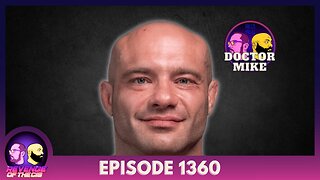The Dr. Chalmers Show Season #3, episode 19 Mental Health is a problem, or is it really a crisis?
#MentalHealthMatters #ExerciseForMentalHealth #TestosteroneAndWellbeing #PrioritizePhysicalActivity #HealthyMindAndBody #SerotoninBoost #OptimalBrainFunction #ChildrensMentalHealth #AdolescentWellness #COVID19Challenges #HolisticApproachToHealth #RestorativeSleep #HormoneBalance #TransformativeExercise #PromotingMentalWellbeing
Dr. Matt Chalmers highlights the importance of exercise and testosterone in addressing mental health challenges. Exercise stimulates testosterone production, positively impacting mental well-being. Neurological signals from physical activity facilitate brain function, particularly in the frontal lobe responsible for emotions and cognition. Exercise also regulates the sympathetic and parasympathetic systems, promoting serotonin production and shifting the body into a state of rest and digestion.
Testosterone, initially developed to treat depression, has proven effective in improving mood and combating depressive symptoms. Regular exercise not only boosts testosterone levels but also enhances muscle development and ATP production, benefiting brain function.
Dr. Chalmers emphasizes the need to prioritize exercise to address the mental health crisis. Society's decline in physical activity, particularly among children and adolescents, has contributed to anxiety, depression, and other mental health issues. Incorporating physical movement into daily routines can significantly reduce these challenges.
While navigating challenges like COVID-19, it's important to address factors that disrupt exercise recovery, such as illness or fatigue. Improving nutrition, optimizing hormone balance, and ensuring sufficient rest and sleep are necessary to restore the body's healing capacity.
In conclusion, prioritizing physical activity and exercise is crucial for addressing mental health issues. By combining exercise with proper nutrition, sleep, and hormone balance, individuals can experience positive changes in psychological function. It's time to recognize the transformative potential of exercise and embrace it for the betterment of mental health.
• Mental health is a significant problem in the United States that affects people across different backgrounds.
• The two key factors to address depression and mental illness are exercise and testosterone.
• Exercise increases testosterone levels, making it an important factor in improving mental health.
• Exercise sends information from the body to the brain, activating the frontal lobe and reducing function in the temporal lobe, which is associated with negative emotions.
• Increased dopamine function and the shift from sympathetic to parasympathetic activity lead to improved mood and higher serotonin production in the gut.
• Testosterone, originally developed to treat depression, is essential for overall health and plays a role in healing and muscle production.
• By exercising and increasing testosterone levels, the body begins to rebuild and regenerate, leading to better physical and mental health.
• Promoting exercise, especially among children and adolescents, can significantly reduce anxiety, depression, and other mental health issues.
• COVID-19 has disrupted exercise routines and may affect the point of diminishing returns, where the body's ability to heal is overwhelmed. Proper nutrition, sleep, and sometimes testosterone supplementation can help restore balance.
• Focusing on nutrition, sleep, hormone balance, and exercise can bring about positive changes in mental health and overall well-being.
• Making a concerted effort to prioritize physical activity and address hormone imbalances can lead to significant improvements in mental health.
-
 1:34:11
1:34:11
Donald Trump Jr.
13 hours agoKamala Krash, Iran Attack Imminent? Erik Prince Live | TRIGGERED Ep.162
213K353 -
 2:18:35
2:18:35
WeAreChange
11 hours agoArmed GROOMING GANGS Patrolling The Streets — UK CIVIL WAR!
123K71 -
 1:11:04
1:11:04
Redacted News
13 hours agoEMERGENCY! GLOBAL MARKET MELTDOWN, US DOLLAR DUMPED AS RECESSION HITS | Redacted w Clayton Morris
212K396 -
 8:51
8:51
Chris Jericho
22 hours agoTalk Is Jericho Highlight: Tony Condello & The Death Tour Documentary
118K3 -
 47:38
47:38
Kimberly Guilfoyle
15 hours agoTrump Cash vs Kamala Krash? Live with Scott Bessent & Stephanie Hamill | Ep. 147
124K53 -
 2:02:47
2:02:47
Revenge of the Cis
13 hours agoEpisode 1360: Doctor Mike
114K38 -
 1:50:06
1:50:06
Film Threat
19 hours agoDEADPOOL & WOLVERINE'S BOFFO BOX OFFICE! | Film Threat Versus
88.9K2 -
 3:44:00
3:44:00
Mostly Sports With Mark Titus and Brandon Walker
16 hours agoMostly Sports College Football Dynasty League | Week 3 Session 1
87.7K -
 26:43
26:43
Stephen Gardner
13 hours ago🔴JUST NOW: PANICKING Kamala shows she's NOT READY!!
111K108 -
 1:01:06
1:01:06
In The Litter Box w/ Jewels & Catturd
1 day agoChicken-mala Harris | In the Litter Box w/ Jewels & Catturd – Ep. 619 – 8/5/2024
113K81